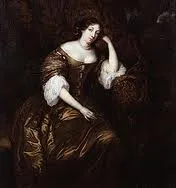Dorothy Osborne and Women Letter Writers
Dorothy Osborne and Women Letter Writers by Dr Femke Molekamp, CSR Research Fellow
Recently I have been doing some research on the very interesting seventeenth-century letter writer Dorothy Osborne. Osborne was the daughter of Royalist, aristocratic parents. In 1646 she travelled to St Malo in France, where her family were residing during the civil wary, and en route she encountered the essayist Sir William Temple, who was to become her secret suitor for many years, before the pair eventually married. Both families were against the match, mostly on financial grounds. Osborne and Temple became correspondents during their courtship, and 77 of Osborne’s letters to Temple survive, written between 1652 and 1654. She wrote the letters covertly, and arranged for each letter to be smuggled out from her family home in Bedfordshire to be delivered to Temple in London. Only one of Temple’s letters survives, as the others were each destroyed after reading. Osborne is a highly engaging, witty epistolary writer, and her letters range over her observations of her society, her private life, the literature she reads and shares with Temple, especially French prose romance, and her philosophical interests. Her letters are artfully constructed, and richly expressive of her ideas and emotions. She gives considerable voice to her ‘passions’ in the letters, and also reflects on the vicissitudes of the passions shared by herself and Temple with recourse to contemporary medical and philosophical ideas. She demonstrates a notable interest in melancholy, and this has been the focus of my research. Her letters at once give voice to the melancholy occasioned by the protracted courtship, and seek means to regulate it. I have recently published an essay on this topic in the Seventeenth Century Journal.
Research on women letter writers of the early modern period is currently flourishing. I recently attended a workshop in Oxford organized by the project Women’s Early Modern Letters Online. WEMLO is in the process of creating a portal for metadata, descriptions, and images of around 3,000 letters from Tudor women. It forms part of the larger Cultures of Knowledge, Early Modern Letters Online project, based at Oxford University, which is creating a catalogue of sixteenth-, seventeenth-, and eighteenth-century correspondence.
The WEMLO workshop was highly stimulating. I learned that Osborne was not the only woman writing illicit letters drawing on the literary genre of prose romance: Elizabeth Bourne was engaged in similar practices some 70-80 years earlier, as recounted in a paper by Daniel Starza Smith. We also heard about gendered archival practices, emotional debris and political strategies in early modern women's letters, among other topics. The workshop highlighted that the field of research on early modern women’s letters is currently growing. Organizers mentioned that talks should be podcast in due course, so watch their website!

